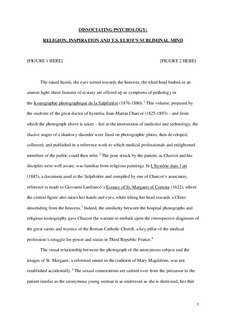Dissociating psychology : religion, inspiration, and T. S. Eliot's subliminal mind
Journal article, Peer reviewed
Accepted version
Permanent lenke
http://hdl.handle.net/11250/2486312Utgivelsesdato
2017Metadata
Vis full innførselSamlinger
Originalversjon
Callison, J. C. (2017). Dissociating psychology: religion, inspiration, and T. S. Eliot's subliminal mind. ELH: English literary history, 84(4), 1029-1059. doi: 10.1353/elh.2017.0039Sammendrag
Using archival resources, I outline T. S. Eliot's fascination with the porous borders between science and religion. I show how the notion of a dissociated consciousness developed by the French psychologist Pierre Janet informed the "dissociation of sensibility," and how Janet's idea, repackaged as the subliminal mind and used by psychologists of religion such as William James, shaped the account of the creative process developed in The Use of Poetry and the Use of Criticism. I suggest this contextualization of Eliot's penchant for both mysticism and skepticism informs the slippages in tone, at once visionary and moribund, in "The Hollow Men."
Beskrivelse
Author's accepted version (post-print).
